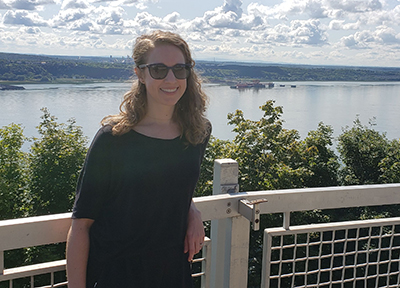As a Biostatistics Project Coordinator who works in epidemiology, Rebecca Rodrigues understands the importance of health data. But at the end of 2020, it got a lot more personal when her own health came into question. Through family testing, Rebecca learned she was positive for a mutation of the BRCA2 gene, putting her at an elevated risk of breast cancer.
 This was devastating news. At the time Rebecca was 39, the same age that her grandmother died of breast cancer. Another relative, an aunt, was a breast cancer survivor and had also been diagnosed with pancreatic cancer. Both illnesses were likely related to the BRCA2 mutation. The family history had prompted her father to undergo genetics testing, and based on his results, he had urged Rebecca to get tested.
This was devastating news. At the time Rebecca was 39, the same age that her grandmother died of breast cancer. Another relative, an aunt, was a breast cancer survivor and had also been diagnosed with pancreatic cancer. Both illnesses were likely related to the BRCA2 mutation. The family history had prompted her father to undergo genetics testing, and based on his results, he had urged Rebecca to get tested.
After the results came in, she immediately began to assess her options. One approach would be to get an imaging test — a mammogram alternating with an MRI — every six months in the hopes of detecting cancer early. It seemed risky, and if cancer did show up, chemotherapy would likely still be necessary.
Instead, Rebecca opted to have a preventative mastectomy, followed by breast reconstruction. “Some women just go flat, which saves the need for any future surgeries,” she said. “But for me I knew I wanted to have reconstruction because I wanted to look and feel like myself as much as possible on the other side of this.”
Rebecca’s breast reconstruction procedure used Dermacell® acellular dermal matrix — a graft made possible through the generosity of tissue donors — to support the healing process. “It’s described as a matrix of thick skin,” Rebecca said. “Your own cells grow around it over time, so it integrates into your body. I thought that was really neat technology for breast reconstruction.”
Following the procedure, Rebecca feels on top of the world. She has a new appreciation for her favorite activities, including baking, reading, and biking from her home base in London Ontario, Canada. She also values spending time with her husband, Jesse, her cat, Sweet Dee, and her three nephews. “I’m just amazed at how well it’s gone and how manageable it’s been,” she said.
Rebecca wrote to her donor’s family through LifeNet Health’s Thanks2You program to express her gratitude. “I’m proud to have donor tissue with me. I am an organ donor through my license. I think it’s great to be able to reuse things you don’t need any more that can give other people life.”
- Read more Stories of Hope
- Learn about donation
